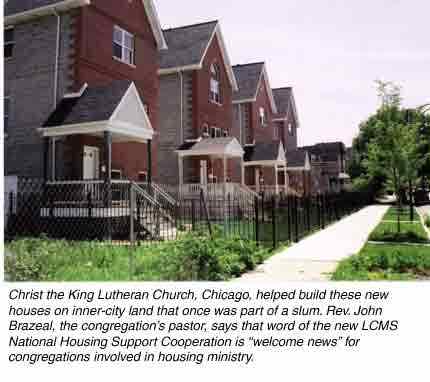 By Kim Krull and Joe Isenhower Jr.
By Kim Krull and Joe Isenhower Jr.
A new LCMS National Housing Support Corporation is designed to help struggling inner-city congregations receive grants and technical assistance for housing ministries — which has been difficult for them, sources say.
The LCMS Board for Human Care Ministries proposed the new nonprofit, national charitable organizations to help congregations, districts and social-ministry organizations with housing and community development.
In November, the Synod’s Board of Directors approved the organization, which has now filed for incorporation with the State of Missouri.
“This is welcome news,” said Rev. John Brazeal, pastor of Christ the King Lutheran Church, a downtown Chicago congregation that has helped rehab and build new homes in a neighborhood once designated a slum.
“As congregations,” Brazeal said, “we want to get involved with our communities and show that we care. But there are so many challenges, from lack of money to what happens if a volunteer steps on a rusty nail.”
“Our districts and congregations are doing some wonderful things in housing ministry,” said Marie Kienker, deputy director of LCMS World Relief/Human Care and the former manager of LCMS Housing Ministries. “Our goal in setting up this new corporation is to partner with them and to serve as a conduit of resources that will help secure funding to meet increased needs for revitalized communities.”
Kienker said that forming a new housing corporation enables access to governmental and private sources of funding otherwise unavailable to the Board for Human Care Ministries. The new corporation, she continued, is “a Synod-controlled corporation formed to assist in carrying out the housing-ministry activities of LCMS World Relief/Human Care.”
Rev. Matthew Harrison, executive director of World Relief/Human Care, led efforts to start the new housing-ministry corporation.
“A congregation is a corporate citizen of a neighborhood, and if that neighborhood is in decline, it’s absolutely the right thing to get involved,” said Harrison.
In the last half of the 1990s, Harrison was pastor of Zion Lutheran Church, Fort Wayne, Ind., leading the congregation’s efforts to help transform its decaying urban neighborhood into a stable community of new and rehabbed homes.
“The complexities that confessional Lutheran congregations face in the inner city can be mind-boggling,” Harrison told . “Often, churches are the only institutions remaining, along with liquor stores and drug houses.
“Inner-city pastors and congregations are so busy just maintaining faithful Word and Sacrament ministries,” he said, “that most don’t have the time or resources to seek help from foundations and other sources.
“The key to a healthy inner-city neighborhood is home ownership,” Harrison continued. “This corporation will make it much simpler for congregations to make sure that their neighbors get loans to own homes. The church can bring decency, civility and order to the inner city with more home ownership. And, ultimately, that opens the door for the church to evangelize in the inner city.”
New potential funding sources give hope to Rev. C. Jay Koehler, a former parish pastor who directs a project by Redeemer Lutheran Church, Interlochen, Mich., to turn 17 acres into housing for retired church workers.
“Our biggest hang-up is money,” said Koehler, who said he is concerned that the Redeemer project will lose support from a local nonprofit if he doesn’t secure another source of funding.
“By doing this [housing-ministry support] on a national level, we have a way to appeal to resources throughout the country instead of being limited on a congregation or … district basis,” Koehler said. “This has got to open a lot more doors.”
Kienker said the Housing Support Corporation continues the Synod’s leadership in housing ministry — “providing decent, affordable housing to low and middle-income families.”
Since 1986, the Synod has been involved in “Nehemiah Plans,” housing initiatives that have stabilized communities and drawn families to churches in cities like Brooklyn, N.Y., and Memphis, Tenn. The Synod also started the Low Income Housing Loan Fund to provide financial assistance for housing ministries.
That fund, however, now stands at less than $1 million, according to Kienker, and provides no money for technical assistance.
“New funding sources are critical,” said Harrison, who, according to the new corporation’s bylaws, will serve on its board of directors through his executive-director position.
At press time, the Board for Human Care Ministries was appointing four other corporation board members, seeking candidates with experience in housing and community-investment banking. The new board is scheduled to hold its first meeting this month.
One of that board’s first efforts, Kienker said, will be to compile successful housing-ministry models and “best practices.” She encouraged veterans of LCMS housing ministry to share their expertise by calling (800) 248-1930, Ext. 1394, or e-mailing her at marie.kienker@lcms.org.
For more information on Harrison’s housing-ministry efforts in Fort Wayne, read his “Theological and Personal Reflections on Confessional Lutheran Involvement in Neighborhood Renewal” at www.worldrelief.lcms.org.
Kim Krull is a freelance writer in St. Louis. She writes for LCMS World Relief/Human Care.
January 2004



